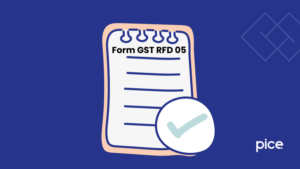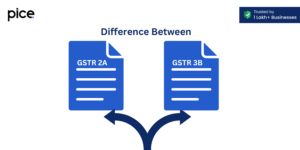GST on Restaurants
- 1 Sep 24
- 9 mins
GST on Restaurants
- What Is GST on Food and Restaurants?
- What Were the Original GST Rules for Restaurants?
- GST Rates on Food, Beverage Services and Accommodation
- GST on Food Items
- Impact of GST on Restaurant and Food Items
- GST Composition Scheme Rules for Restaurants
- Mandatory Indications for Restaurants Under the GST Composition Scheme
- Compliance Requirements for Restaurants Under GST
- Conclusion
Key Takeaways
- Restaurant GST Rates: GST on restaurants varies between 5%, 12%, and 18%, depending on factors like location and amenities.
- Simplified Taxation: GST has replaced VAT and service tax, reducing tax liabilities for many restaurant owners.
- GST on Food Items: Food item GST rates range from nil to 28%, with higher rates for luxury items like chocolates.
- GST Composition Scheme: Small restaurants can opt for a 5% GST under the composition scheme, but they cannot claim Input Tax Credit.
- Compliance Requirements: Restaurants with turnover above ₹20 lakh must register for GST and clearly display their tax status if under the composition scheme.
The Goods and Services Tax (GST) has helped streamline the earlier intricate taxation rules in India. It is an indirect tax reform that is imposed on the supply of goods and services made across the nation.
Restaurants and hotels also come under GST compliance norms as they contribute significantly to the economy. The particular restaurant GST rate however depends on several factors. This blog is all about unravelling the GST structure for food and beverage as well as accommodation services. Thus, hotel and restaurant operators can surely keep this guide handy for smooth operation from now on.
What Is GST on Food and Restaurants?

The GST rates charged across various food and beverage service outlets in India can be 5%, 12% or 18% depending on multiple factors. The location of restaurant or kiosk apart from the amenities present plays a vital role in deciding the rate.
Previously, restaurants used to levy VAT and a mandatory service tax upon providing their services. Now, the GST has replaced both of these elements. However, most restaurants still impose a service tax that is separate from GST.
Additionally, establishments that serve alcoholic drinks apply a Value Added Tax (VAT) alongside the applicable GST against the alcohol served. It is a state-level tax and thus varies from one state to another.
While purchasing food items from the market, an individual has to bear GST that ranges from nil to 18% based on the items bought.
What Were the Original GST Rules for Restaurants?
The GST Act first came into action in July, 2017. At that time, restaurants were segmented into three broad categories. For instance, non-AC restaurants used to charge a GST rate of 12%. On the other hand, for those having air conditioning facilities and holding a liquor licence, an 18% restaurant GST rate is applicable. Finally, restaurant setups that were built within five-star hotels would charge 28% GST.
Initially, all Indian food businesses could claim the Input Tax Credit (ITC) for materials that were purchased for their business.
In case you are confused about how it worked, it is basically a method to reduce the tax burden of food and beverage outlets. The ITC applies when the supplier of products or services has already paid GST while procuring raw materials for their business. This amount needs to be subtracted from an individual's GST bill to avoid the instance of double taxation.
GST Rates on Food, Beverage Services and Accommodation
For comprehensive details about the GST applicable on restaurant services, food and beverage items, as well as accommodation, we suggest you refer to the table provided below.
| Particulars | GST Rate |
| Services offered by standalone restaurants that may or may not have an AC connection (this even includes takeaway food joints) | 5% with no Input Tax Credit |
| Food and non-alcoholic beverages supplied by cafeterias/canteens that are in temporary contract with an industrial unit, school, college, etc. Here the contract basis shouldn’t be associated with a particular occasion or event. | 5% with no Input Tax Credit |
| Food and beverage services offered within a hotel where the maximum room tariff is less than or equal to ₹7,500 | 5% with no Input Tax Credit |
| Food and beverage services offered within a hotel where the room tariff starts from ₹7,500 | 18% |
| Food service given by the Indian Railways on trains and railway platforms | 5% with no Input Tax Credit |
| Food services at a function premise, provided by a licensed authority | 18% |
| Food services available at conferences, exhibitions, events, and outdoor catering services for the duration of the occasion | 18% |
| Other types of food and beverage services and accommodation | 18% |
Note: The restaurant GST rate chart discussed here is subject to periodic change.
GST on Food Items
We have presented a detailed table below to explain the applicable GST on various foods available at restaurants:

| Particulars | GST Rate |
| Fresh and chilled vegetables such as potatoes, ginger, garlic, onions, etc. | Nil GST |
| Dried and shelled leguminous vegetables that are not packed in a container | Nil GST |
| Fresh apples, pears, grapes, fresh/dried coconut, etc. | Nil GST |
| Meat (supplied without a container) - either fresh or dried | Nil GST |
| Eggs (preserved/fresh/cooked) | Nil GST |
| Unsweetened milk or cream | Nil GST |
| Steamed/boiled/uncooked vegetables supplied in containers | Nil GST |
| Vegetables preserved in brine or other solutions that make them not suitable for immediate human consumption | Nil GST |
| Meat packed in containers with a trademark or brand name | 5% GST |
| Eggs not in shell | 5% GST |
| Dried leguminous food items that are packed in branded containers | 5% GST |
| Ginger (not fresh ginger), turmeric (not fresh turmeric), bay leaves, curry leaves, thyme, etc. | 5% GST |
| Powder or meal prepared out of dried leguminous vegetables | 5% GST |
| Edible plant parts that are preserved using sugar | 12% GST |
| Edible plant parts that are preserved using acetic acid/ vinegar | 12% GST |
| Chocolate and other cocoa products | 18% GST |
| Food preparations that include flour, malt extract, etc. containing cocoa not more than 40% of the net weight | 18% GST |
Please note that the highest rate of GST applicable in the food segment is 28%, which is applicable to certain goods such as caffeinated and carbonated beverages.
Impact of GST on Restaurant and Food Items

Although the GST has summed up Service Tax and VAT amounts into one single rate, still you may see a dedicated service charge tagged to your food bill. Below, we have presented a comparison table illustrating the changes in food bills before and after the introduction of GST.
| Particulars | Billing Before GST Was Introduced (During VAT Regime) | Billing Under GST Regime |
| Total Bill | ₹3,500 | ₹3,500 |
| Output Tax | ||
| VAT @14.5% | ₹507.50 | |
| Service Tax@6% | ₹210 | |
| GST @5% | ₹175 | |
| Total Output Tax Liability | ₹717.50 | ₹175 |
| Input Credit | ||
| VAT ITC (no ITC on Service Tax) | ₹52.50 | |
| GST ITC | ||
| Final Output Tax Liability | ||
| VAT | ₹454.86 | |
| Service Tax | ₹210.14 | |
| GST | ₹175 |
As per this instance, the restaurant owner would have had a net tax obligation of ₹665 towards the tax authorities before the introduction of GST. However, as per the current GST rules, the net tax outflow will only be ₹175, thanks to the revised rates.
GST Composition Scheme Rules for Restaurants
Food businesses can take the benefit of a concessional 5% GST rate when they opt for the composition scheme. However, for that, they must ensure maintaining the following conditions:
- Annual turnover has to be under ₹1.5 crore. For special category states, this benchmark has been set as ₹1 crore.
- There must be exclusive engagement in restaurant services. Nevertheless, certain services like exempt and interest ones can be exempted.
- The food business cannot engage in interstate outward supply of finished products.
- No non-GST items can be sold at the establishment such as alcohol.
- The restaurant cannot take help from e-commerce operators to deliver food and beverages.
- The owner will not be allowed to claim ITC.
- The customers are not liable to pay any GST.
Eligible business operators within the food industry can utilise the composition scheme to simplify their output tax commitments.
Mandatory Indications for Restaurants Under the GST Composition Scheme
Restaurants that have opted for the GST Composition Scheme must follow a couple of guidelines to clarify their taxation status:
- Indication on Supply of Bills
The top of the food bill must include this phrase: “Composition Taxable Person, not eligible to collect tax on supplies”.
- Display at Business Premises
On any notice or signboard that is being used at the place of establishment, there has to be a prominent mention declaring “Composition Taxable Person”.
The above two practices help clearly communicate a restaurant's tax status to its customers.
Compliance Requirements for Restaurants Under GST
Any restaurant where the annual turnover exceeds ₹20 lakh must register their business under the GST Act. In addition, owners can opt for voluntary registration even if their turnover is below ₹20 lakh.
Conclusion
The restaurant GST rate for a particular business is decided by tax authorities, who reconcile a number of factors. Depending on the outcome, the owner must clear the due GST within the 20th of the following month. For any inquiries about the tax implications on the food industry, it is recommended to have this guide readily available until the next GST declaration is published.
💡If you want to pay your GST with Credit Card, then download Pice Business Payment App. Pice is the one stop app for paying all your business expenses.
 By
By 

















